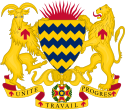 |
|---|
|
|
Human rights in Chad have been described as "poor"; for example, Freedom House has designated[when?] the country as "Not Free."[1][2] Chad received a score of 7 for political rights and 6 for civil liberties (with 1 being the most free, 7 being the least free).[2]
According to the U.S. State Department, "The government's poor human rights record deteriorated further during the year[which?]; security forces committed numerous serious human rights abuses." Among the abuses listed were extrajudicial killings, beatings, torture, and rape by security forces; limits on freedom of speech and the press and freedom of assembly; arbitrary arrest and detention; and widespread corruption.[1] Security forces commit these and other abuses with "near total" impunity.[1][3][4]
Amnesty International has reported[when?] that "The widespread insecurity in eastern Chad had particularly severe consequences for women, who suffered grave human rights abuses, including rape, during attacks on villages"[4] by Janjawid militia from Sudan. Women face widespread discrimination and violence. Female genital mutilation, while technically illegal, is still widely practiced.[2] Harassment of journalists and human rights activists has also been documented[4] as well as the use of child soldiers by Chadian security forces, by various human rights groups.[1][5][6]
Transparency International has ranked Chad as one of the most corrupt nations in the world. In 2007[needs update], it scored 1.8 out of 10 on the Corruption Perceptions Index (with 10 being the least corrupt). Only Tonga, Uzbekistan, Haiti, Iraq, Myanmar, and Somalia scored lower.[7] Critics of former President Idriss Déby accused him of cronyism and favoring his own tribe, the Zaghawa.[8] Déby's re-election in May 2006—in which he won a third term—was boycotted by the opposition, who denounced the results as fraudulent.[9] The previous election, in 2001, was similarly viewed as fraudulent by the opposition parties, although a team of foreign observers said that polling had taken place "without major problems or intimidation".[10][11][12]
- ^ a b c d "Chad" Country Reports on Human Rights Practices 2006. United States Department of State. Accessed on September 4, 2007.
- ^ a b c Chad (2007) Freedom House. Accessed on September 4, 2007.
- ^ Chad: Events of 2006 Archived 2008-11-10 at the Wayback Machine Human Rights Watch. Accessed on September 4, 2007.
- ^ a b c Annual Report: Chad Archived 2011-02-18 at the Wayback Machine Amnesty International. Accessed on September 4, 2007.
- ^ "Chad: Government Keeps Children in Army Ranks" Archived 2008-11-10 at the Wayback Machine Human Rights Watch. Accessed on September 4, 2007.
- ^ "Chad: Army Forcibly Recruiting Youths, Rights Group Says" allAfrica.com. Accessed on December 16, 2007
- ^ "Corruption Perceptions Index 2007" Archived 2008-04-28 at the Wayback Machine Transparency International. Accessed on December 16, 2007.
- ^ "'Isolated' Déby clings to power" BBC News. April 13, 2006. Accessed on September 4, 2007.
- ^ Country profile: Chad BBC News. Last updated: August 28, 2007. Accessed on September 4, 2007.
- ^ "Deby re-elected president of Chad" Archived 2009-08-23 at the Wayback Machine CNN. May 28, 2001. Accessed on September 4, 2007.
- ^ "Deby claims Chad electoral victory" BBC News. May 28, 2001. Accessed on September 4, 2007.
- ^ Background Note: Chad United States Department of State. Accessed on September 4, 2007.